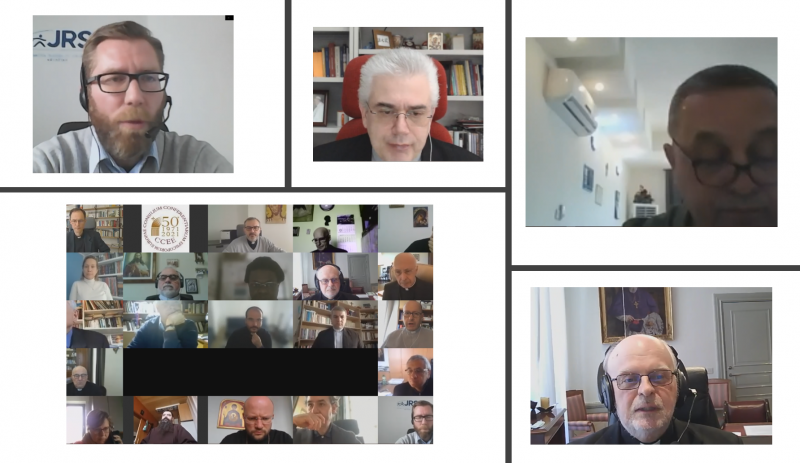On the morning of 19 April, the on-line seminar of the Migration Section of the CCEE Social Pastoral Care Commission took place with the participation of 33 experts and delegates from 25 European Bishops’ Conferences and Church bodies working in the field of assistance to migrants and refugees. The webinar was also attended by a large group of students from the Pontifical Urbanian University’s online course on migration and ethical issues (Rome).
The seminar began with greetings from the CCEE President, Card. Angelo Bagnasco, from the President of the Commission, H. E. Msgr. Giampaolo Crepaldi, and from Fr Martin Michalíček, CCEE General Secretary.
The first report, entitled “The Concern of Pope Francis for Migrants and Refugees in the context of the Current Health Emergency”, was entrusted to Fr Fabio Baggio CS, Under-secretary of the Migrants and Refugees Section of the Dicastery for Promoting Integral Human Development (Vatican). In his address, Fr Baggio presented the Holy See’s initiatives in relation to the health emergency, in particular highlighting the impact they have on the pastoral care of migrants. Immediately afterwards, he presented the recently published “Pastoral Orientations on Climate Displaced People” and pointed out the importance of the theme of the next World Migrant and Refugee Day, which invites all to commit themselves to the perspective of “an ever larger us”. Fr Baggio affirmed that it is essential “to act now for the future”, with the aim of communicating hope through the different forms of commitment of the Catholic Church in support of migrants and refugees.
The second report, entitled “The Balkan Route and the Challenges of the Pandemic”, was presented by Fr Stanko Perica SJ, Regional Director of Jesuit Service for Refugees of south-east Europe. With the help of audio-visual material, Fr Perica pointed out some of the many challenges and dangers faced by migrants and refugees crossing and – often – getting stuck on the so-called “Balkan route”. He then highlighted the seriousness of the situation in the border town of Bihać, while showing the concern of various Catholic bodies and local churches that do their utmost to alleviate, as far as possible, the suffering of migrants.
The third report, entitled “Rebuilding Peace in Charity: The Contribution of Christians in Iraq”, was entrusted to Mr Nabil Nissan, Executive Director of Caritas Iraq, who highlighted the role that Christian communities have historically played in promoting social cohesion in Iraq. After recalling some of the crucial moments of recent tragedies, he emphasised the joy and gratitude of all the Iraqi people for the recent pastoral visit of Pope Francis, which has reinvigorated the common will to work together in the reconstruction of the country.
Card. Anders Arborelius, Bishop of Stockholm and Head of the Migration Section of the CCEE Social Pastoral Care Commission, presented concluding remarks, inviting all to renew hope and to continue with commitment in the work in favour of migrants and refugees who are received or assisted by the different European Church bodies.
The seminar was concluded by the reflection and prayer from Card. Angelo Bagnasco, CCEE President, who thanked the participants for the great work being done in support of migrants and refugees in Europe and hoped to “besiege European political bodies” so that the situation of migrants and refugees finds a better response, with an ecclesial and civil involvement more charged with humanity and Christian values, as an expression of the Christian roots of the European culture.

